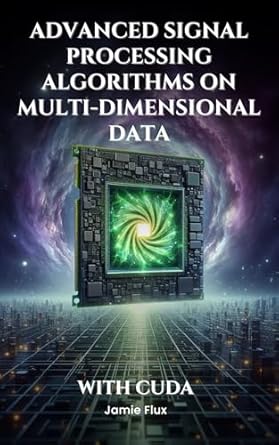Unlock the future of signal processing with “Advanced Signal Processing Algorithms on Multi-Dimensional Data With CUDA.” This essential resource is perfect for researchers, engineers, and advanced practitioners eager to leverage cutting-edge computational techniques for multi-dimensional data analysis. With 99 meticulously crafted chapters, this book dives deep into sophisticated algorithms and theoretical frameworks that are reshaping the field.
From optimized multi-dimensional Fourier transforms to innovative deep learning architectures, each chapter presents groundbreaking ideas and the latest research breakthroughs. Whether you’re exploring graph signal processing or advanced Kalman filter techniques, this book equips you with the tools needed to excel in today’s data-driven landscape. Discover how to harness the power of CUDA and pyCUDA to elevate your signal processing mastery!
Advanced Signal Processing Algorithms on Multi-Dimensional Data With CUDA (GPU Mastery Series: Unlocking CUDA’s Power using pyCUDA) [Print Replica]
Why This Book Stands Out?
- Comprehensive Coverage: With 99 meticulously crafted chapters, this book offers an in-depth exploration of advanced signal processing algorithms tailored for multi-dimensional data, catering to both researchers and practitioners.
- Cutting-Edge Techniques: Learn about state-of-the-art methods such as optimized multi-dimensional DFT and accelerated FFT algorithms that push the boundaries of efficiency and accuracy in data processing.
- Innovative Applications: Dive into groundbreaking topics like sparse representation and compressed sensing, with real-world applications in medical imaging and remote sensing that highlight the book’s practical relevance.
- Interdisciplinary Insights: The book bridges graph theory and signal processing, offering novel algorithms that analyze complex data structures, perfect for tackling challenges in social networks and biological systems.
- Deep Learning Integration: Gain insights into how deep learning architectures are adapted for multi-dimensional data, enhancing your understanding of modern AI applications in signal processing.
- Advanced Theoretical Frameworks: Explore sophisticated concepts such as topological data analysis and hybrid time-frequency analysis, providing a rich theoretical background to support innovative applications.
- Practical Focus: Each chapter not only discusses algorithms but also provides insights into the latest research breakthroughs, ensuring that you stay at the forefront of the field.
Personal Experience
As I delved into the pages of Advanced Signal Processing Algorithms on Multi-Dimensional Data With CUDA, I found myself reflecting on my own journey in the realm of signal processing. This book is not just a collection of advanced algorithms; it feels like a gateway into a world where technology meets creativity, where complex problems find elegant solutions. Each chapter present a fresh perspective, inviting readers to explore ideas that not only challenge the mind but also ignite a passion for discovery.
I remember the first time I encountered the concept of multi-dimensional data analysis. It was during a project that pushed my understanding of signal processing to its limits. The challenges I faced were daunting, and I often felt like I was navigating through a fog of uncertainty. This book resonates with those moments, offering clarity where I once found confusion. The meticulous explanations of algorithms, particularly in areas like accelerated multi-dimensional Fast Fourier Transform and sparse representation, remind me of that enlightening ‘aha!’ moment when everything clicks into place.
For anyone who has struggled with the intricacies of algorithms or has felt overwhelmed by the rapid advancements in technology, this book serves as a comforting companion. It speaks directly to the heart of those late-night study sessions filled with coffee and determination. As I flipped through the chapters, I could almost feel the shared excitement of fellow researchers and engineers who have walked similar paths, tackling complex problems and celebrating small victories along the way.
- The joy of watching theoretical concepts transform into practical applications, much like the innovative approaches discussed in the book.
- A sense of belonging to a community of learners and practitioners who are equally passionate about pushing the boundaries of what is possible.
- Moments of inspiration that spark new ideas and projects, encouraging readers to experiment and explore beyond the pages.
Ultimately, this book is more than just a technical manual; it’s a source of motivation and a reminder that we are all part of a larger narrative in the world of signal processing. It encourages us to embrace complexity and to see challenges as opportunities for growth. I can’t help but feel that this journey through the chapters will resonate with many readers, each finding their own reflections and inspirations along the way.
Who Should Read This Book?
If you’re passionate about signal processing and eager to dive deep into the world of advanced algorithms, then this book is tailor-made for you! Whether you’re a seasoned researcher, an engineer in the field, or a dedicated practitioner, you’ll find invaluable insights and techniques that can elevate your work to the next level.
Here’s why this book is perfect for you:
- Researchers: If you’re pushing the boundaries of current knowledge in signal processing, this comprehensive guide offers 99 meticulously crafted chapters filled with innovative ideas and original theories that will inspire your next research project.
- Engineers: For those working in applied fields, the practical algorithms and optimization techniques discussed here will enhance your ability to analyze and process multi-dimensional data efficiently, making your projects more effective.
- Advanced Practitioners: If you’re already familiar with the basics and looking to expand your expertise, this book provides cutting-edge computational techniques that are crucial for mastering modern signal processing tasks.
- Students and Academics: If you’re studying or teaching advanced signal processing, this book serves as a valuable resource that bridges theoretical concepts and practical applications, making complex ideas more accessible.
With its focus on innovative algorithms, deep learning architectures, and advanced computational techniques, this book is a unique treasure trove that will empower you to harness the full potential of CUDA and pyCUDA in your signal processing endeavors. Don’t miss out on the opportunity to unlock new capabilities in your work!
Advanced Signal Processing Algorithms on Multi-Dimensional Data With CUDA (GPU Mastery Series: Unlocking CUDA’s Power using pyCUDA) [Print Replica]
Key Takeaways
This book is an essential guide for anyone looking to deepen their understanding of advanced signal processing techniques applied to multi-dimensional data. Here are the key insights and benefits you can expect from reading:
- Comprehensive Coverage: With 99 chapters, the book provides an in-depth exploration of a wide range of sophisticated algorithms and theoretical frameworks.
- Optimized Algorithms: Learn advanced optimization techniques for Multi-dimensional Discrete Fourier Transform and Fast Fourier Transform, reducing computational complexity effectively.
- Sparse Representations: Discover innovative approaches to compressed sensing and tensor decomposition that have significant applications in medical imaging and remote sensing.
- Graph Signal Processing: Gain insights into novel algorithms that combine graph theory with signal processing, useful for analyzing complex data structures like social networks.
- Deep Learning Integration: Explore the latest deep learning architectures designed for multi-dimensional signal processing, enhancing your toolkit for spatial-temporal data analysis.
- Topological Data Analysis: Understand how algebraic topology can be applied to extract meaningful features from complex datasets, boosting your data mining capabilities.
- Advanced Filtering Techniques: Learn about cutting-edge Kalman filter techniques adapted for high-dimensional spaces, improving state estimation in complex systems.
- Hybrid Analysis Methods: Discover how to integrate various time-frequency analysis techniques to analyze both localized and global features in diverse applications.
- Nonlinear Signal Processing: Investigate kernel methods that allow nonlinear operations within a linear complexity framework, enhancing applications in pattern recognition and data compression.
Final Thoughts
If you are looking to elevate your understanding of advanced signal processing techniques, Advanced Signal Processing Algorithms on Multi-Dimensional Data With CUDA is an essential addition to your library. This comprehensive guide not only covers a wide range of sophisticated algorithms but also provides invaluable insights into the latest research breakthroughs in the field.
With 99 meticulously crafted chapters, this book is designed for researchers, engineers, and advanced practitioners who want to harness the power of CUDA for multi-dimensional data analysis. Here are some key highlights that make this book a must-have:
- Optimized Techniques: Learn advanced strategies for implementing the multi-dimensional Discrete Fourier Transform.
- Cutting-Edge Algorithms: Explore accelerated Fast Fourier Transform algorithms that maintain accuracy while enhancing processing speed.
- Innovative Applications: Discover the use of tensor decomposition methods in medical imaging and remote sensing.
- Deep Learning Integration: Gain insights into modern deep learning architectures tailored for multi-dimensional signal processing.
- Advanced Filtering: Dive into sophisticated Kalman filter techniques for high-dimensional state spaces.
Whether you’re a seasoned professional or just starting your journey in signal processing, this book is crafted to deepen your knowledge and broaden your skill set. Don’t miss out on the opportunity to unlock the potential of cutting-edge computational techniques; invest in your future today!





